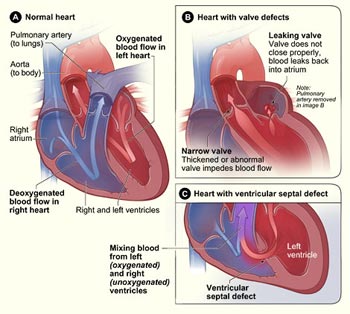
When the heart does something more than ‘lub-dub’Just the thought of a heart murmur in your child may be enough to invoke dreadful visions of heart disease and dysfunction. However, in most cases the murmur is entirely innocent and will not stop your child from living a happy, active life. Here, Mediscene speaks with Dr. Sepalika Mendis, Cardiologist at the Colombo General Hospital about heart murmurs - both innocent and pathological. Understanding murmurs To begin with, what exactly is a heart murmur? The term 'heart murmur' isn't a diagnosis of an illness in itself. A normal heartbeat makes two sounds like "lub-DUB," which are the sounds of your heart valves closing. The words 'heart murmur' describe any abnormal sound (i.e aside from your heart beat) made by blood in or near your heart, explains Dr. Mendis, adding that it is most often a low frequency rumbling or swishing sound.
Murmurs, it turns out, are common in babies and young children. In fact, researchers have found that 50% of full term newborns have heart murmurs, she reveals. Many children are born with murmurs (known as congenital murmurs). Others may develop one only later in life, even as adolescents. A majority of these will prove to be entirely harmless - in no way affecting the well being of the child. However, sometimes a heart murmur is cause for serious concern. Innocent murmurs The most common type of heart murmur is called "functional or innocent", explains Dr. Mendis. Resulting from the fast rate at which children's hearts beat or normal variations in the structure of the heart, innocent murmurs are nothing to worry about as this diagnosis means the murmur is produced by a normal, healthy heart. It can come and go throughout childhood. Common innocent murmurs include Venous Hum and the Pulmonary Ejection Murmur, among several others. These harmless murmurs often disappear after a while; in fact in the case of the Venus Hum pressing the jugular vein gently will immediately bring respite from the murmur. Kids with innocent heart murmurs don't require a special diet, restriction of activities, or any other special treatment. Pathological murmurs A heart murmur is among the most common sign of congenital heart disease due to abnormal development of the heart tissues, reveals Dr. Mendis. This includes atrial or ventricular septal defects and abnormalities of the heart valves. Septal defects involve the walls (or septum) that divide the four chambers of the heart. A hole in the septum can result in blood flowing through it into the heart's other chambers. This extra blood flow may cause a murmur. It can also make the heart work too hard and may cause the heart to enlarge. Some holes may be large enough to produce symptoms in addition to a heart murmur; others are smaller and may close on their own in time. When this happens in the upper chambers of the heart - i.e the atrium - it is known as an Atrial Septal Defect (ASD). When this happens in the lower chambers of the heart -i.e the ventricles - it is known as Ventricular Septal Defect (VSD). Valve abnormalities are also common. There are four valves (one-way openings) between the heart chambers that keep the blood from flowing backward as the heart beats. Valves that are narrowed or blocked don't permit smooth blood flow; valves that are shaped abnormally may not be able to keep the blood from flowing backward within the heart. Either condition will cause a murmur. Other pathological murmurs include patent ductus arteriosus (a connection between the aorta and the pulmonary artery that should close after birth but doesn't) and other rarer problems. Heart murmurs may also be caused by heart failure and infection involving the heart. Symptoms, diagnosis and treatment Doctors hear heart murmurs when using a stethoscope, a device that allows them to hear your heart and blood flow, during medical examinations. Innocent murmurs, being entirely harmless, do not have any accompanying symptoms, and are almost always discovered unintentionally. Some factors, such as fever or excitement, make an innocent murmur more likely because they increase the speed at which the heart pumps. On the other hand, pathological heart murmurs that indicate a more serious condition may cause symptoms including chest pain; shortness of breath; dizziness and fainting; bluish tinge to the skin in the area of the lips, tongue, and nails; fatigue and difficulty in breathing during exercise; sucking abnormalities, rapid heart rate and failure to thrive. Heart murmurs are graded on the following categories: i) Intensity; from 1 up to 6, with 1 being 'barely audible' and 6 being 'audible with the stethoscope of the chest’. If your doctor suspects a problem, he or she may choose to refer your child to a paediatric cardiologist - a doctor who specialises in treating children with heart problems. The cardiologist will examine your child and might do tests to find out if there is a problem. These tests include chest x-ray, electrocardiogram (EKG or ECG) or echocardiogram (sometimes called an "echo"). Treatment depends on the cause of the murmur. Innocent murmurs need no treatment and the child can lead a normal active life. Depending on the severity, congenital heart disease often requires major cardiac surgery. |
|| Front
Page | News | Editorial | Columns | Sports | Plus | Financial
Times | International | Mirror | TV
Times | Funday
Times | MediScene || |
| |
Copyright
2007 Wijeya
Newspapers Ltd.Colombo. Sri Lanka. |
